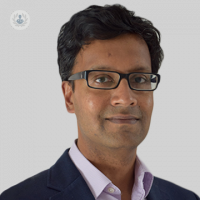Post-COVID-19: the physical and mental complications during recovery
Written in association with:By now, we all know the main symptoms of COVID-19 and, as it’s well documented in the news, we have a much better understanding of what happens to our bodies when we get infected by the coronavirus. However, what we don’t hear or see much of is what people go through during the recovery period.
As Dr Anjani Prasad, a leading pulmonologist points out, patients recovering from COVID-19 can develop several complications. But these aren't just physical as you might expect, some patients can go on to develop certain mental health problems too. In this article, Dr Prasad describes these complications for us and explains the type of research going into understanding them better.

What are the most common physical complications of COVID-19?
One of the commonest physical problems is of breathlessness. As we know, some people may have breathing difficulties after recovering from COVID-19; most likely due to the inflammation of the lungs which can take a number of weeks to months to reduce. We now understand, however, that it is possible for some patients who have had severe symptoms, for example, those who needed intensive care ventilation, to have permanent damage to the lungs. Also, there is a possibility that receiving ventilator support itself can cause harmful side-effects to the lungs.
Fortunately, the lungs do have a great capacity to repair themselves, so we will only know with time if the inflammation becomes irreversible.
Several research centres are working to understand more about this, including the British Thoracic Society (BTS), so hopefully, over time we can get a clearer picture. Additionally, respiratory centres, such as Glenfield's Hospital in Leicester, are researching into rehabilitation post-COVID-19, looking at both physical and respiratory rehab.
There are several breathing exercises that patients can do to improve their exercise capacity which we will explore later in my next article.
What physical complications can occur?
For patients recovering from COVID-19, the following complications can occur:
- You struggle to breathe while resting or being active
- You can’t do things you could do before getting ill
- You’re tired or low on energy
- Your heart races faster
What mental health complications can occur?
There are also mental health complications that should not be underestimated. You may notice things like:
- Being forgetful
- Not being able to think clearly
- Struggling with daily tasks that involve organising, planning and problem solving
- Emotional problems
You may find you have symptoms of certain mental health conditions, such as:
As your body needs time to recover, you can expect the physical and mental symptoms to persist for a while. We will discuss how to deal with these issues later in my upcoming articles.
Dr Anjani Prasad is an expert consultant in respiratory medicine with a specialist interest in interventional pulmonology. If you are recovering from COVID-19 and would like to speak with him, visit his Top Doctors profile and book an e-Consultation.


